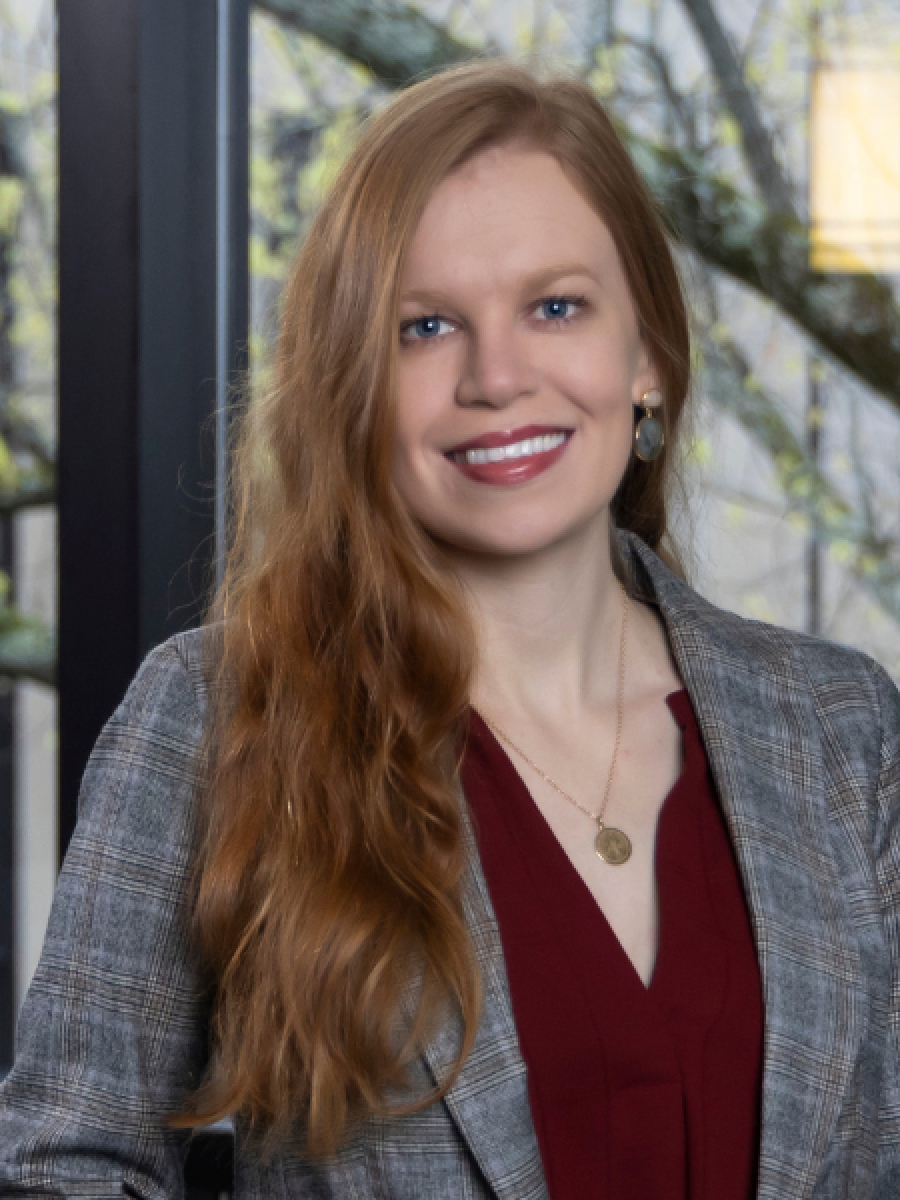
Mary-Michael Robertson
J.D. 2024
Associate,
Kirkland & Ellis
Inspired by the natural surroundings of her childhood in south-central Virginia and her parents’ work as an engineer and state laboratory compliance inspector, Mary-Michael Robertson found herself drawn to environmental engineering. “I wanted to have a technical basis for whatever I chose to pursue after college,” she explained, “and it just appealed to me the most.”
She attended the University of Virginia, first earning a B.S. in Civil & Environmental Engineering – along with minors in Urban & Environmental Planning, Global Sustainability, and Science & Technology Policy – and then a Master of Urban & Environmental Planning. Through classes and internships (including one at the Southern Environmental Law Center), she gained exposure to lawyers and legal work that helped her realize law school was “probably the right choice,” and so she applied during her master’s program.
Vanderbilt stood out to Robertson for its Southeastern location, history of nationwide placement, and the collegial reputation she experienced through recruiting events. She was particularly impressed by the Environmental, Energy & Land Use Program (EELU), which aligned with the career paths that interested her the most when she began law school. “I knew I wanted to enter a field within that realm, but I wasn’t completely sure,” she said.
Robertson explored each potential interest through her summer internships. She spent her first summer at Frost Brown Todd’s Nashville office, working with real estate and land use attorneys, which she really enjoyed. In her second summer, she found her ideal fit working in the environmental transactions group at Kirkland & Ellis’ Dallas office. “I think environmental law fits my strengths and background perfectly, having concentrated in environmental and water resources at UVA,” she said. The tight-knit group, which included Vanderbilt alumni, offered a great opportunity to work closely with and learn from the team, evaluating the environmental impact of mergers and acquisitions. She will be returning to the group after graduation as an Associate.
She took full advantage of the EELU curriculum. From foundational courses like Land Use with Professor Christopher Serkin, Energy Law with Professor Jim Rossi, and Environmental Law I and II with Professor Michael Vandenbergh, to short courses like Water Law, Oil and Gas Law, and Sustainable Cities and seminars like Climate Change Governance (with Professor J.B. Ruhl), Robertson has taken “most of the EELU program classes one can take, feasibly.”
“Vanderbilt is offering an increasingly wide array of courses in that field. I feel very prepared for my career,” she said.
Extracurricular activities associated with EELU offered significant educational benefits for Robertson as well. Through programming sponsored by the Energy and Environmental Law Society (EELS), she learned about the variety of environmental law career paths from practitioners, including Vanderbilt alumni. Robertson also credits Vandenbergh with introducing the different roles that environmental attorneys and firms play in the legal landscape.
In her time on Environmental Law and Policy Annual Review (ELPAR) – as an Editor her 2L year, Managing Editor as a 3L – she read the most impactful environmental scholarship published in the past two years. “It’s an excellent way to learn a lot about environmental law; not only theory, but practice, because we try to highlight articles that are feasible and have a real policy proposal,” she explained. Through her work on ELPAR, Robertson was also able to meet academics and practitioners who are experts and leaders in the field of environmental law.
Robertson’s experiences outside of EELU have also played a significant role in her legal education and career search. Classes in the Law & Business Program prepared her for the transactional side of her work at Kirkland & Ellis. She is also a Notes Editor on the Journal of Entertainment and Technology Law, which speaks to her engineering background and love of music, a passion she indulges regularly with trips to Nashville venues like the Ryman and Basement East. “You can hear wonderful musicians everywhere you go in Nashville, not just the larger venues,” she said. Her Note, Navigating the Tension Between Preservation and Development Pressure: Cities’ Imperative to Save Independent Music Landmarks While Simultaneously Providing for Growth, was published in the Journal in the fall.
Robertson encourages incoming environmental law students to take advantage of the chances to interact with experts and professors – “they offer such a wealth of resources.” She specifically recommends Vanderbilt for the strength of the EELU program, the school’s employment outcomes, and the supportive nature of the students and professors. “When I came in, I was nervous about adjusting to the Socratic Method and the style of law school, because I was an engineering student. But at Vanderbilt, it was such a friendly environment.”